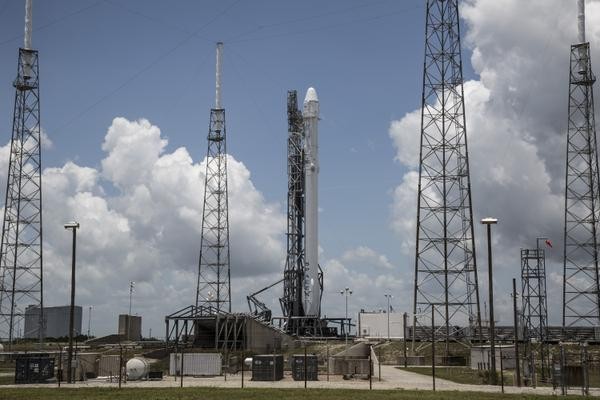In a few hours, worms, lettuce and a huge parking station for future "space taxis" are now onboard SpaceX's Dragon cargo capsule where preparations are all set for today's launch at 10:21 A.M. local time from the Cape Canaveral Air Force Station in Florida.
This is SpaceX's third attempt to land its Falcon 9 rocket on a floating barge platform on the Atlantic ocean, after it launches the Dragon capsule in lower Earth orbit.
Apparently, this is also Elon Musk's grand effort to revamp its rockets in order to refrain from wasting expensive rocket parts and make them reusable by reflying them instead of dumping them into the ocean upon re-entry into the atmosphere.
This will happen after moments after the launch, when the Dragon capsule is now en route for orbit where the rocket will re-ignite its engines to navigate itself back to the launch site, specifically to the floating barge located off the Atlantic ocean for an upright landing.
The first attempt to land the rocket upright on the floating barge was January of this year where the rocket smashed into the drone ship landing platform as it ran out of hydraulic fluid to steer its fins and land properly.
The second try was last April where the rocket did manage to steady itself down on the floating platform in the upright position however, it fell off balance and ended up in another fiery explosion. SpaceX revealed that a malfunctioning valve that was controlling the rocket engine was the culprit for the failed landing.
On this third attempt, according to Hans Koenigsmann who is the vice president of SpaceX's mission assurance, there were a lot to be learned from these past attempts however, it is still hard to say if the next attempt will finally become a success.
Meanwhile, the precious cargo resupply aboard the Dragon capsule bound for the International Space Station includes two important experiments that will help astronauts to cultivate their own food in space in order to provide sustainability for the next manned mission to Mars.
More specifically, one of these experiments will involve developing a greenhouse in space that will provide astronauts the right environment to grow lettuce in space such as the Tokyo Bekana cabbage which is a bitter leafy green.
The other experiment involves how 11 worms can withstand space conditions by living in a simple compost box in space which is devised by middle schoolers from Colorado.
The worms will be frozen in order to hibernate for the launch where they will be revived when they reach the ISS upon room temperature. The goal of this experiment is to observe how red wiggler worms can successfully decompose and turn soil with eggshells, coffee grounds and newspaper into compost while in space.



























